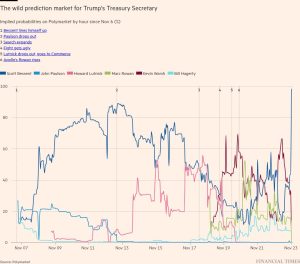Why are some countries richer than others? Ask the Nobel economists
Unlock the Editor’s Digest for free
Roula Khalaf, Editor of the FT, selects her favourite stories in this weekly newsletter.
There weren’t many jaws on the floor when the Sveriges Riksbank Prize in Economic Sciences in Memory of Alfred Nobel went to Daron Acemoglu and Simon Johnson of MIT and James Robinson of the University of Chicago. Acemoglu is so prolific he has a blog dedicated to him, featuring “facts” such as “the law of large numbers has been renamed the law of Daron’s citation counts”.
The trio won for research asking why some countries are richer than others, and arguing that institutions, which include things like well-enforced property rights and an independent judiciary, were key for development. More controversially, they claimed to show that events centuries ago are still affecting economic outcomes today.
The idea that institutions matter for growth seems pretty obvious. But how much they matter is less clear. What if factors such as geography influence both institutions and growth, or what if growth itself promotes good institutions? Precision is made harder by institutions being hard to quantify, dreadful historical data and there being only so many countries to batter with statistical tests.
Mark Koyama of George Mason University and Jared Rubin of Chapman University explain that before Acemoglu and his co-authors came along, research into the importance of institutions was in danger of fizzling out. Its older statistical approach looked increasingly lame next to the hot new methods deployed by microeconomists, which analysed quasi-experiments to pin down causal effects.
The prize-winners applied those newer methods to big historical questions. Their paper, published in 2001, started by searching for an “instrument”, something that would only affect economic outcomes today by influencing colonial institutions. They landed on settler mortality rates, reasoning that where tropical diseases deterred colonisers from moving in en masse, those who did come would be more likely to design institutions with weaker property rights, in order to extract wealth.
The economists estimated that institutions set up centuries ago have surprisingly persistent effects. And in other work (which also won them the prize) they developed a theory to explain why such institutions might be so difficult to change.
Others followed their empirical work. Nathan Nunn of Harvard University, for example, estimated how much the slave trade still stunts Africa’s economies today. Melissa Dell, also of Harvard University, found that forced labour in Peru between 1573 and 1812 was still affecting children’s outcomes in the 2000s. Koyama and Rubin’s book How the World Became Rich notes fresh nuances, including that property rights can be too secure. A strength of England’s parliament in the 17th and 18th centuries, for example, was its reassigning of property rights to make seizing new technological opportunities in mining easier.
As the prize-winners’ citation counts have grown, so has the volume of voices questioning their results. Did the settlers really only bring institutions with them, or might an influx of skills and knowhow have mattered too? The prize committee noted the difficulty of distinguishing between the effects of human capital and institutions, and that the specific estimates should be taken “with a grain of salt”.
An even broader concern is that the techniques used to identify connections between outcomes hundreds of years apart are less precise than advertised. A paper forthcoming in the Journal of International Economics by Timothy Conley of the University of Western Ontario and Morgan Kelly of University College Dublin warns that signs of persistence may be a “spurious correlation”, a bit like seeing two things rising over time and inferring that one causes the other. And if neighbouring places tend to be quite similar, data describing each will have less information than it might seem.
Conley and Kelly emphasise that they are questioning whether it is possible to show conclusively that institutions have long-lasting effects with the data we have, not arguing that the effects do not exist. Kirill Borusyak of the University of California, Berkeley, says that those working outside this field never took the results to be as precise as was claimed, but that the data should still tell us something.
Other complaints include that research into persistence overstates the inevitability of different countries’ progress. But appreciating how and why the effects of historical institutions matter today is not the same as arguing that we are powerless to change course. And, as the Nobel committee ultimately decided, such efforts to answer one of economics’ biggest questions are worth recognising.
Follow Soumaya Keynes with myFT and on X
The Economics Show with Soumaya Keynes is a new podcast from the FT bringing listeners a deeper understanding of the most complex global economic issues in easy-to-digest weekly episodes. Listen to new episodes every Monday on Apple, Spotify, Pocket Casts or wherever you get your podcasts
#countries #richer #Nobel #economists




